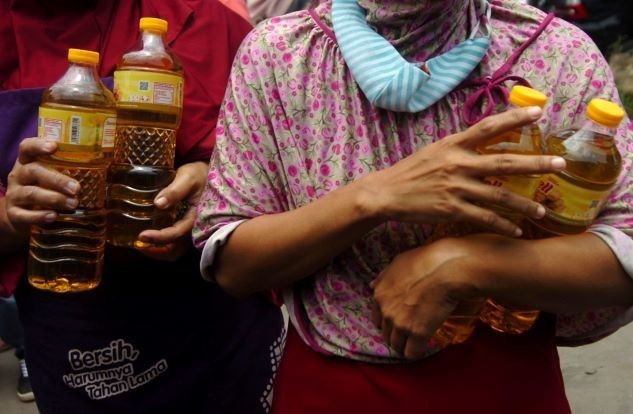News
MinyaKita scandal exposes weakness in govt’s anti-market policy
Tenggara Strategics March 21, 2025 Oiled up: Residents carry bottles of cooking oil during a market operation conducted by the Trade Ministry at Trayeman traditional market in Tegal, Central Java, on Monday. Each household was entitled to 1.2 liters of cooking oil at a price of Rp 14,000 (
Oiled up: Residents carry bottles of cooking oil during a market operation conducted by the Trade Ministry at Trayeman traditional market in Tegal, Central Java, on Monday. Each household was entitled to 1.2 liters of cooking oil at a price of Rp 14,000 (
The recent scandal over MinyaKita has exposed a crack in the government and structural flaws in the domestic market obligation (DMO) policy. According to economists, the anti-market policy fails to account for volatile crude palm oil (CPO) prices, leaving producers struggling to meet costs and incentivizing violations.
MinyaKita, a brand of low-priced cooking oil introduced by the government to stabilize domestic prices following the 2021-2022 cooking oil supply crisis, soared recently to Rp 17,000 (US$1.1) to Rp 20,000 per liter, higher than the cap of Rp 15,700. Public frustration escalated in early March, when a viral video revealed that a 1-liter bottle of MinyaKita actually contained just 750 milliliters. The video, which racked up over 1.5 million views, prompted calls for stricter oversight.
Trade Minister Budi Santoso initially denied any irregularities, dismissing the allegations as outdated. At a press conference on March 5, Budi insisted that MinyaKita with substandard packaging had been removed from the market following the government’s Jan. 24 crackdown on PT Navyta Nabati Indonesia, the company accused of underfilling MinyaKita bottles. He also said the viral video was misleading, as Navyta had been sanctioned, its facilities sealed and business license revoked.
Just three days later on March 8, however, Agriculture Minister Andi Amran Sulaiman and the Food Task Force uncovered new instances of underweight MinyaKita packages during an inspection at Lenteng Agung Market in South Jakarta. Three days after this discovery, another incident was uncovered on March 11 in Surakarta, Central Java, where officials found that a 1 L package of MinyaKita sold at Rp 18,000 per liter contained 750-800 mL of cooking oil.
President Prabowo Subianto was reportedly outraged over the widespread fraud, and he instructed authorities to take decisive action against those responsible. National Police chief Gen. Listyo Sigit Prabowo responded by launching a special task force, led by Brig. Gen. Helfi Assegaf, to investigate the distribution of substandard MinyaKita packages. Following evidence gathered by the Agriculture Ministry, the police identified multiple distributors engaged in systematic underfill, with up to 200 mL missing from both 1 L bottles and 2 L pouches of MinyaKita.
Among the three manufacturers under investigation are PT Artha Eka Global Asia in Depok, West Java, and Koperasi Produsen UMKM Kelompok Terpadu Nusantara in Kudus, Central Java, both of which produce 1 L MinyaKita bottles, as well as PT Tunas Agro Indolestari in Tangerang, Banten, which produces 2 L MinyaKita pouches. In addition, the Jakarta Metropolitan Police’s special crimes unit has flagged Tangerang-based distributor CV Rabani Bersaudara for its suspected role in the fraudulent distribution of underweight MinyaKita products.
Amran said the Agriculture Ministry would work with the Food Task Force and the police to enforce penalties, including factory shutdowns and legal action. However, when pressed on whether his ministry would collaborate with the Trade Ministry to improve MinyaKita’s distribution, Amran avoided giving a clear response, saying only that his priority was to prove the existence of fraud and ensuring immediate enforcement measures. Meanwhile, the Trade Ministry has announced plans to recall all 1 L packages of MinyaKita that contained 750-800 mL.
Economists have pointed to structural flaws in the government’s DMO policy as the root of ongoing supply and pricing issues surrounding MinyaKita. The DMO policy obliges palm oil producers to allocate a portion of their CPO output for domestic cooking oil at a fixed price, but does not account for market fluctuations in CPO prices.
Over the past six months, CPO prices have ranged between Rp 15,000 and Rp 16,000 per kilogram, significantly higher than the government-set price of Rp 13,400 per kilogram for MinyaKita production. Factoring in processing, distribution and profit margins, manufacturers have been unable to meet the price cap without financial losses.
Under existing regulations, producers must sell MinyaKita to first-tier distributors at a maximum Rp 13,500 per liter, which is below most production costs. Faced with this economic reality, producers have two choices: absorb losses or violate regulations by either illicitly reducing the amount of cooking oil in a package or selling at higher prices.
The DMO policy, originally designed to stabilize supply and prices following the 2021-2022 cooking oil shortage, has failed to adapt to market conditions. Without an immediate revision, MinyaKita producers will continue to face financial strain, potentially leading to further violations and supply chain disruptions.

